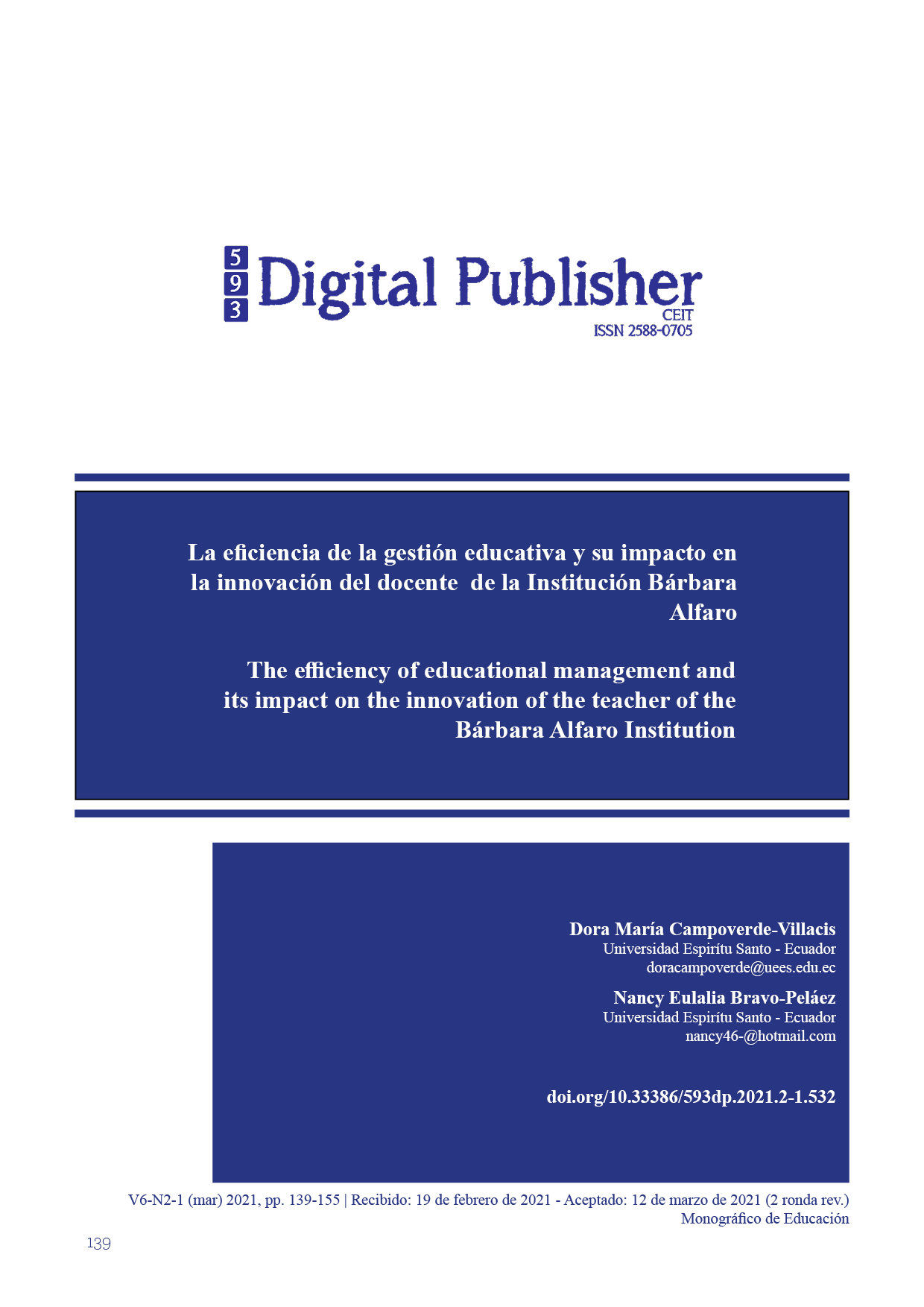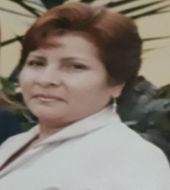The efficiency of educational management and its impact on the innovation of the teacher of the Bárbara Alfaro Institution
Main Article Content
Abstract
Management and educational innovation have been two topics of discussion and reflection in scientific events in Latin America, variables considered in the research. The objective of the article consisted of building efficient management strategies for educational management and strengthening the innovation of the teacher of the Bárbara Alfaro Institution. The methodology was with the rational positivist paradigm, with the quantitative epistemological approach, using the scientific methods: explanatory and historical - logical, which allowed obtaining research information from the last five years and facilitated the description of the facts as they were observed. Likewise, empirical methods were used: observation, which allowed in a planned and objective way the pedagogical measurement of the teacher at the beginning and end of the 2020 -2021 school year. The population and sample was census with 1 manager and 8 teachers. The survey technique and the questionnaire instrument were applied with the non-experimental method, through which the real events in the educational institution under study were evidenced and described. The results were positive and in favor of the question formulated in the problem, reflecting the need for the proposal designed with efficient management strategies for educational management and thus strengthening the innovation of the teacher of the Institution
Downloads
Article Details

This work is licensed under a Creative Commons Attribution-NonCommercial-ShareAlike 4.0 International License.
1. Derechos de autor
Las obras que se publican en 593 Digital Publisher CEIT están sujetas a los siguientes términos:
1.1. 593 Digital Publisher CEIT, conserva los derechos patrimoniales (copyright) de las obras publicadas, favorece y permite la reutilización de las mismas bajo la licencia Licencia Creative Commons 4.0 de Reconocimiento-NoComercial-CompartirIgual 4.0, por lo cual se pueden copiar, usar, difundir, transmitir y exponer públicamente, siempre que:
1.1.a. Se cite la autoría y fuente original de su publicación (revista, editorial, URL).
1.1.b. No se usen para fines comerciales u onerosos.
1.1.c. Se mencione la existencia y especificaciones de esta licencia de uso.
References
Aguiar, B. o., Velázquez, R. m., & Aguiar, J. L. (2019). “Innovación docente y empleo de las Tic en la Educación Superior. Espacios, 8 volumen 40. Recuperado el 19 de Junio de 2020, de https://www.revistaespacios.com/a19v40n02/a19v40n02p08.pdf
Aguiar, B. V. (2018). Innovación Docente y el empleo de las TIC en la Educación Superior. Revistas Espacios.
Arias Gómez, J., Villasís Keever, M. Á., & Miranda Novales, M. G. ( abril-junio de 2016). El protocolo de investigación III: la población de estudio. Ram. Alergia Mexico, 63(2), 201-206. Obtenido de https://www.redalyc.org/pdf/4867/486755023011.pdf
Brenes, M. (2015). Las Innovaciones Pedagógicas y la Gestión de la Educación en la Escuela Nuevo Laboratorio “Emma Gamboa” . Revista Gestión de Educación., Vol. 5( N° 2 ).
Cueto, S. (2016). Innovacion y Calida en Educaciòn en America Latina (Primera Edicion ed.). (C. Santiago, Ed.) Peru, Lima: Grambs Corporaciòn Gràfica S.A.C.
Fernández, D. &. (2015). La Nueva Elite. La transición evolutiva de la Sociedad Chilena. Santiago de Chile: Catalonia. Chile. .
García, R. R. (2015). De profesor tradicional a profesor innovador. Revista digital para profesionales de la enseñanza,funda lucia, https://www.feandalucia.ccoo.es/docu/p5sd7620.pdf.
Génesis, M. &. (2015). Gestión de Calidad del Talento Humano en las Organizaciones Educativas Inteligentes. . Revista Científica de Ciencias Humanas.
Gonzalez Gonzalez, N. J. (2019). Formacion docente centrada en investigacion. Maracaibo Estado Zulia: Vice Rectorado Administrativo de Luz.
Gonzlez Nelia;Pirela Alonso;Barros Roosevelt. (2018). Desarrollo de competencias investigativas en la gestion del conocimiento en Educacion Superior (Vol. 10). Guayaquil: Fondo Editorial Universitario de la Univesidad Nacional ExperimentalSur del Lago.
Hernández Sampieri, R. F. (2019). Metodología de la investigación. Mexico. D.F: McGraw-Hill.
Hernández Sampieri, R. F. (2019). Metodología de la investigación. Mexico. D.F: McGraw-Hill.
Instituto para el Desarrollo y la Innovacion Educativa (IDIE-OEI). (2017). Desarrollo de innovaciones en la ollo de innovaciones en la educación y atención educación y atención de niños y niñas de 0 a 6 años de niños y niñas de 0 a 6 años de niños y niñas de 0 a 6 años. AndaLucia OEI, 7-44.
Martinez Dorado, Y. -I. (2017). La Innovacion y el Humanismo. Perspectiva desde y para la Educacion Superior. Coepes.
México, O. (2015). Acuerdo de Cooperación México-OCDE para mejorar la Calidad de la Educación de las Escuelas Mexicanas. OCDE, México.
MINEDUC. (2018). Ministerio de Educacion. Obtenido de https://educacion.gob.ec/valores-mision-vision/
Morón. (2016). “Valores Democráticos”. Vol. 8 (N° 1).
Murillo, J. &. (2015). Retos de la Evaluación de la Calidad de América Latina. Revista Iberoamericana de Educación., Vol. 1 (N°1).
Ochoa Mendoza, D., & Prieto López, Y. (2017). Estrategia para estimular el aprendizaje en los estudiantes de primer año de la Educación Básica en la Universidad de Guayaquil. Luz. Año XVI. (1), pp.64-76, enero-marzo, 2017. Edición 69. III Época. ISSN 1814-151X, XVI(1), 64-76. Obtenido de http://luz.uho.edu.cu
Orellana López, D. M., & Sánchez Gómez, M. C. (2006). Técnicas De Recolección De Datos En Entornos Virtuales Más Usadas En La Investigación Cualitativa. Revista de Investigación Educativa. RIE, 24(1), 205-222. Obtenido de https://www.redalyc.org/pdf/2833/283321886011.pdf
Pericacho, F. (2019). Quality improvement in educational centers: exemplification of three fields of teacher analysis and innovation. Madrid. España.: Antonio de Nebrija University. DOI: 10.1590/s0104-40362019002701621. Obtenido de http://scholar.google.com.ec/scholar?q=Pericacho.+2019.+Improvement+Processes+in+Educational+Centers.&hl=es&as_sdt=0&as_vis=1&oi=scholart
Robbins, S. (2015). Organizational behavior. Theory and practice. México.: Prentice hall Hispanoamericana. . Obtenido de http://scholar.google.com.ec/scholar?q=Robbins,+S.+(2015).+Organizational+behavior.+Theory+and+practice.+Mexico+.:+Editorial+Prentice+hall+Hispanoamericana.+.&hl=es&as_sdt=0&as_vis=1&oi=scholart
Rodríguez, S. (2015). Técnica de Investigación Social. Madrid: Editorial Cantaura: Segunda Edición.
Soler, M. &. (2015). Journal of Teaching Experience. Obtenido de http://scholar.google.com.ec/scholar?q=Soler,+M.+%26+Mart%C3%ADnez,+N.+Curricular+Management+based+on+Academic+Quality&hl=es&as_sdt=0&as_vis=1&oi=scholart
UNESCO, O. d. (2018). Manual de gestión para directores de instituciones educativas. Obtenido de http:// unesdoc.unesco.org/images/0021/002191/219162s.pdf
Venegas, J. (2015). La educación en un contexto de Calidad: Enfoques del siglo XXI. Lección Inaugural. Cartago. Costa Rica. : Dirección Regional de Turrialba. .



